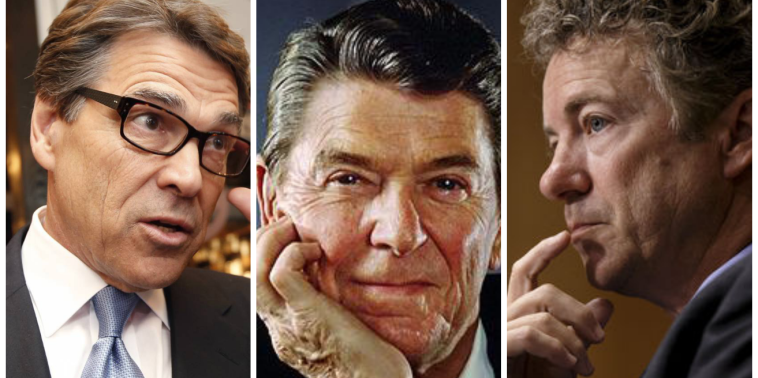Hardly a week goes by without Republicans debating which of their possible 2016 presidential candidates best embodies the legacy of Ronald Reagan. This time, it is Texas Gov. Rick Perry and Kentucky Sen. Rand Paul going a few rounds.
Videos By Rare
“Reagan led proudly from the front, not from behind, and when he drew a ‘red line,’ the world knew exactly what that meant,” Perry opined in the Washington Post. Rand Paul, he said, was no Ronald Reagan.
“Some of Reagan’s Republican champions today praise his rhetoric but forget his actions,” Paul retorted in Politico. “Reagan was stern, but he wasn’t stupid. Reagan hated war, particularly the specter of nuclear war.”
All of Paul’s Reagan observations are true. And Perry is undoubtedly right that Reagan wasn’t a noninterventionist.
But while participating in a Heritage Foundation panel discussion on Reagan last week, I began to wonder if this approach—What would Reagan do?—may be too backward-looking. One of my co-panelists, Weekly Standard Bill Kristol, pointed out how much Reagan changed the Republican Party.
Barry Goldwater, the Senate’s Mr. Conservative, actually voted against the Kennedy-Johnson tax cuts—which included across-the-board reductions in marginal income tax rates and lowering a top rate that stood at a staggering 91 percent—in 1963. Reagan converted the GOP to supply-side economics and tax-cutting. This became a central plank of his economic platform only two years after the Kemp-Roth tax cut was first introduced.
The 1976 Republican platform was hopelessly muddled on abortion. It supported both “a constitutional amendment to restore protection of the right to life for unborn children” and “a continuance of the public dialogue on abortion.” Gerald Ford was the closest the party has ever come to nominating a pro-choice presidential candidate. Reagan turned the party pro-life.
On foreign policy, Reagan didn’t just slam Jimmy Carter for being ineffective (though Carter’s ineffectiveness was perhaps the paramount issue of the 1980 campaign). He criticized détente, which was at the heart of the foreign policy pursued by Henry Kissinger in the two prior Republican administrations. He opposed the Panama Canal treaty, which had been supported by Senate Republican Leader Howard Baker and conservative eminences like William F. Buckley, Jr.
In some cases, Reagan was a convert on these issues himself. He reluctantly signed a bill liberalizing abortion when he was governor of California, when the impact on the number of purely elective abortions was still unknown. He also acceded to some tax increases as governor (he would do so again as president, but he was a substantial net tax cutter, trimming the top tax rate from 70 percent to 28 percent).
Each time, however, Reagan applied conservative principles in a different way to find solutions to contemporary problems. And although a deeply principled conservative, he did not just blindly repeat what Republicans had done in the past.
When necessary, Reagan changed Republican orthodoxy.
In 1980, no pollster would have advised making the GOP a pro-life party. Although exit polls would find opposition to abortion was likely a net vote winner in several presidential elections because single-issue abortion voters are predominantly pro-life, as late as the 1990s majorities identified as pro-choice. (That has since changed.)
Supply-side economics was controversial even among Republicans. George Bush famously called it “voodoo economics.” Bob Dole was a skeptic, leading a Republican backbencher named Newt Gingrich to label him the “tax collector for the welfare state.”
Today it is hard to imagine a Republican Party that isn’t pro-life and for tax cuts.
So instead of simply reiterating the 1980 Republican platform, how might a Republican presidential candidate emulate Reagan in applying conservative principles differently to challenges the country faces currently?
A few ideas: returning to some of the pre-supply side focus on spending restraint and debt reduction; reforming outdated entitlement programs that were designed for the demographics 1930s and 1960s; seeing how limited government applies to nonviolent offenders whose lives are ruined by jail as well as small businessmen imprisoned by red tape; exercising some Burkean prudence in foreign affairs; enforcing the Fourth and Sixth Amendments as rigorously as the Second.
Maybe what best safeguarded U.S. national security at the height of the Cold War, facing a nuclear-armed Soviet Union, isn’t what will best protect Americans from stateless terror networks and smaller rogue states.
Such an agenda might not be identical to the one Ronald Reagan pursued. But it might be the best way for a Republican leader—Rand Paul, perhaps?—to do what Reagan did for the GOP decades ago once again in our own time.

